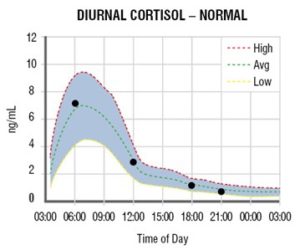Let’s face it, life is stressful! Whether it’s work, school, relationships, financial, or whatever, we all have some sort of stressors in our lives. And if you don’t, please let me know your secrets! While stress is an inevitable part of life, things can get much harder for your health when you’re chronically stressed. Meaning, you’re stressed for long periods of time. Check out our blog post from January 15th for a review on just how much stress impacts our bodies. For now, we’re going to dive deeper into your main stress hormone, cortisol. When you’re chronically stressed, you run the risk of having cortisol imbalances.

What does this mean? Cortisol levels rise in response to stress. Think your “fight or flight” response! You experience a stressor, your adrenal glands produce cortisol, and then there is a cascading effect in your body. 1) Glucose is released in your body. 2) Insulin production slows down so that glucose can be immediately used instead of being stored. 3) Your heart starts beating faster as your arteries narrow and epinephrine increases. Then, ideally, you will handle the stressor and things can return to normal.
But what happens when you don’t handle the stressor? Experiencing the stress of coming face to face with a bear and being able to get away is a lot different than the stress of working 8 hours, trying to get the kids home from daycare, preparing dinner, getting everyone cleaned up, trying to get a workout in, and then making it to bed at a reasonable time. But our body doesn’t know the difference in these types of stress. Whether that’s an acute stress (like being sick, hurting yourself, almost getting in a car wreck), chronic stress (work, school, life stressors), or even good stress (intense workouts, changing jobs, moving houses), it just feels stress. And when our stress is high for long periods of time, that’s when we really start to see those negative impacts. Not only does high cortisol impact us, but low cortisol does as well! And often, people who have long-term high cortisol end up having low cortisol later down the road when the body can no longer keep up with the demand for increased cortisol production.

Since cortisol production is part of your HPA axis (hypothalamus-pituitary-adrenal), it can also impact your thyroid and sex hormones when it’s not working properly. This can express itself as weight gain, acne, or hair loss from increased androgen and DHEA levels; slowed down digestion leading to constipation, bloating, and food intolerances; decreased insulin sensitivity which increases blood sugar dysregulation; impaired thyroid hormone conversion; increased cravings for salty or sugary foods; and even auto immune disease flair ups. And that isn’t even everything!
Now I know that it may seem like a scary thing. It also probably seems like an unavoidable thing. There’s no way to say “You know what? I’m just going to stop being stressed!” and then BAM you’re not. Unfortunately that’s not how things work. However, there are diet and lifestyle changes we can make to help lower those levels.
Throughout the day, our cortisol levels should follow a pattern. In the morning when you wake, cortisol starts to rise. It should peak about 30 minutes after waking and leave us feeling energized and ready to take on the day. As the day goes on, cortisol levels gently lower until it’s time for bed. Then in the evening, we can wind down and sleep. Getting good sleep ensures that our cortisol levels have time to return to normal and the cycle starts again the next day. Practicing good sleep hygiene can be huge for helping cortisol, especially if you tend to find yourself extra tired upon waking, or “tired but wired” in the evenings. Sleep hygiene includes following a consistent sleep schedule by waking up at the same time each day and going to bed at the same time each night, avoiding electronic screens (like the TV or your phone) while lying in bed, no caffeine after 2-3pm, and making sure your bedroom is dark, quiet, and a comfortable temperature.

Diet-wise, making sure you get all your vitamins, minerals, and other important nutrients is key! Eating a variety of fruits, vegetables, whole grains, and good fats to make sure you get omega-3s, vitamin D, B vitamins, zinc, and magnesium. An anti-inflammatory diet approach (see our May 17th blog post) may be beneficial. Limiting added sugars and caffeine can help as well. Supplementing with adaptogens like ashwagandha, holy basil, maca, or rhodiola rosea may help as well, but make sure you talk with your RD or doctor before starting any supplementation.
Lastly, learning other positive mental health tactics is essential! Saying “no” when there’s too much on your plate, practicing self-care, journaling, speaking with a therapist – whatever it is that you need to do for yourself. These lifestyle changes are key to balancing cortisol. Remember: you need to address the root cause of your stressors if you want to see long-term changes.
Curious if you have a cortisol imbalance? Reach out to us to learn about taking the DUTCH test, which New Leaf Nutrition’s® dietitian, Alex, is trained to administer. The Dried Urine Test for Comprehensive Hormones offers a look at your cortisol levels at 4-5 points during the day (as well as your sex hormones, metabolites, and organic acids) – check out dutchtest.com to learn more. You can also speak with your doctor about receiving either a saliva or blood test to access cortisol levels.
-Alex Harris, MA, RD, LD, CPT
Comments
BE THE FIRST TO WRITE A COMMENT